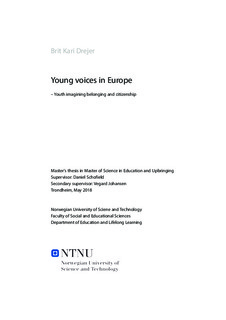Young voices in Europe - Youth imagining belonging and citizenship
Master thesis
Permanent lenke
http://hdl.handle.net/11250/2571497Utgivelsesdato
2018Metadata
Vis full innførselSamlinger
Sammendrag
This qualitative study investigated young Europeans’ negotiations of belonging, their perceptions of Europe and the relationship of these perceptions with democratic participation. The study, as part of the Why Europe Matters (WEM) campaign and research project, gathers in-depth data to complement the previous WEM quantitative study. The research contributes to knowledge on how individuals experience globalisation and how societal structures interplay with agents, enabling ways of enacting democracy. In focus groups, 25 participants aged 16– 25 years in Norway, Spain and Finland were interviewed, using photo elicitation and drawing as probes for discussion. Different analytic models and methods were employed, enabling a study of varied ways of expressing belonging. Phenomenological analysis focused on the thematic content in the accounts of belonging, pointing to the prominence of belonging as connected to agency and feelings. Discourse analysis showed that these experiences of belonging and notions of the nation-state and Europe are not passively received but enacted, drawing on different repertoires. The sociocultural perspective of multivoicedness was applied to analyse which voices are present in the utterances and from where these might have come from. The analysis found a relationship between voices/repertoires, imagination and mediated action, suggesting that the available discourses offer affordances for enacting democracy. The analysis identified several distinct voices that nurture democratic imaginary and hence enactment of citizenship. The most prominent voices found are the agentive, normative cosmopolitan and pro-European voices. These repertoires indicate public assumptions of antinationalism and enables solidarity but might constrain democratic enactment by advocating individualisation and universalism.
